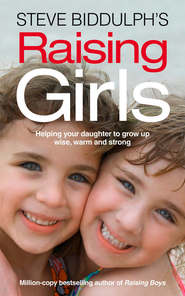По всем вопросам обращайтесь на: info@litportal.ru
(©) 2003-2024.
✖
Raising Boys: Why Boys are Different – and How to Help them Become Happy and Well-Balanced Men
Автор
Год написания книги
2019
Настройки чтения
Размер шрифта
Высота строк
Поля
© Fotokostic/Shutterstock.com
At four, boys start onto their real boyhood, and for many of them that includes a great need for movement and action. It’s a serious parental challenge to find ways for our boys (and girls) to express their physical energy safely and sociably, and still stay connected to them and their feelings so they know they are loved. In fact, the whole challenge of being male, lifelong, is learning that it’s possible to be energetic and safe, boisterous and thoughtful, adventurous and responsible. Understanding your boy’s nature is the first step. The second step is engaging with him and helping him to learn how to steer it well. That takes patience, empathy, and good-humoured persistence. The whole purpose of this book is to help you with that.
STORIES FROM THE HEART
A PARENT’S POINT OF VIEW
One anonymous parent on a discussion forum put it better than I ever could have, so I am going to let her have the last word:
I think if you ask a lot of parents with both girls and boys they will confirm that this effect with boys seems to be a real thing. It happens in home-educated kids as much as ones in school/nursery at this age. It also happens in families like mine where we made a real, informed effort not to introduce gender stereotypes (I mean, I lived in a radical feminist commune for five years). My experience is that yes, there is a push for independence at age four to five … but it’s more an aggression, a wild energy, an inability to listen to instructions. I actually think almost every single neurotypical boy I know has hit this … and it often leaves parents reeling and gets labelled as bad behaviour. I don’t much think it matters what causes it, personally, whether it’s social or chemical. And I am completely up for the idea that some girls will also experience something like this, though I saw nothing like what I saw in my son in my two girls. I think sometimes people see it as an excuse for bad behaviour in boys and it’s not. What I think is important is that it is a real phenomenon and needs to be treated as such, and that is far more important to me than the biochemistry behind it.
By six, young Jamie is out of the changes we have described, and seems to settle down. He can handle school better, and focus more. He still loves to be active, but is more sociable. He is not terribly interested in girls, but gets along well if they share interests. You can breathe a sigh of relief. Enjoy these years of respite, because you have earned them. And because, just round the corner are the ‘insecure eights’!
Adrenarche – the Eight-Year-Old Meltdown and What to Do About It
After a few easy years, Jamie’s parents notice something odd. Once a calm and contented boy, at around eight years of age (or it may be a little later in some boys), he may start being more emotional and easily upset. What does this mean? Some remarkable new findings have been made about a stage at least two years before puberty, that affects the emotional stability of boys.9 (#litres_trial_promo) If you have an eight-year-old who has become much more tearful or bad-tempered around the age of eight, this may be what is going on. (Of course, you should also check out other possible causes – that something bad hasn’t happened to him – just to be on the safe side.)
In a long-term study of 1,200 boys at Melbourne’s Murdoch Institute, it was discovered that adrenarche makes boys have greater emotional problems at this age.10 (#litres_trial_promo) (In girls, that did not happen until real puberty came along.)
Puberty in boys, which has obvious signs like pubic hair, deepening voice, and so on, usually happens at around ten to thirteen years of age. But adrenarche comes a couple of years sooner, and is the preparatory, and largely invisible, stage as a boy’s body gets ready for the leap into manhood. While there are few outer changes, on the inside things are bubbling up. It’s not that young Jamie is actually feeling angry, but he is just more easily rattled or upset (though of course it can turn into aggression in an insecure boy or one who sees lots of violence around him). And so Jamie’s parents may need to be more understanding, and helpful as he navigates feelings he isn’t used to.
Here is how one mother described it.
Our son had always been good-natured and gentle but when he was in Grade 4 (eight to nine years old) he would get so angry and frustrated at things that never used to bother him before. We’ve always been able to talk about these things and so luckily he could tell us: ‘sometimes I get so angry I just want to hit something’, for example, after a little tiff with his younger sister, who knew how to push his buttons. In the past he had been able to shrug that off. Now, you could see the anger rising in him and that he was scared and didn’t like feeling this way. We gave him some tools to help cope, like going into his room and hitting his pillow if he had to (to avoid him hitting his sister, which he never did, by the way). We also contacted his primary school and asked the counsellor to have a chat with him. The counsellor was great, and reiterated the things we were telling him: go for a walk, distract your mind, etc., but coming from someone with authority it backed up our parenting and gave him another outlet if he needed it. Things started to settle down after about twelve months. We still have our gentle caring young man and I put it down to pre-pubescent hormones starting to ‘kick in’. He’s now fourteen and going great.
(Our thanks to Burnice B. for this great description.)
What to Do
1 Be understanding. If he has a meltdown during the day, choose a time to discuss it, for example at bedtime, when he will feel calmer and more able to talk.
2 Talk to him about how he is feeling, and ask what it is like for him when those emotions come up. Getting it into words always helps.
3 Explain to him about the changes of adrenarche when his body is getting ready for puberty in a year or two’s time, and how his hormones stir up emotions more strongly than in the past.
4 Explain that it will settle down. And his feelings still matter, they have a purpose, and that you can work with him to make life more easy, when he experiences things like unfairness, aggression or thoughtlessness in others. He isn’t imagining things, just reacting more strongly than usual.
5 Strategies like going for a walk to cool off, doing some exercise to let off steam, or talking to you about it, are all fine.
Somewhere between the ages of ten and thirteen, puberty proper finally sets in. Testosterone levels start to rise steadily. Eventually – usually around fourteen – they will increase by some 800 per cent over the level of toddlerhood. (When I mention this in my talks on Raising Boys, I pause as a ripple of fright runs across the auditorium like a Mexican wave!) The passage to manhood has now begun. There is no need to be afraid – adolescence is often given a bad rap, whereas it is really an exciting and heart-warming time, though of course it has its challenges. Once again, it’s all about being prepared.
Brains Go Out of the Window
Jamie’s adolescence can’t be missed. It starts with a sudden growth and elongation of his arms and legs – so much so that his whole nervous system has to rewire itself. He gets clumsy and awkward. On the inside, neural pruning is massive as his brain starts to reshape into the much more focused mind needed for adulthood. In about 50 per cent of boys, testosterone levels are so high that some of it converts into oestrogen, and breast swelling and tenderness may be experienced. This is nothing to worry about.
By thirteen, the reorganisation of Jamie’s brain makes him dopey and disorganised for many months. His mother and father have to act as his substitute brain for a while! If they’re not aware of the reasons for this, parents can wonder where they have gone wrong. But if Jamie’s parents know this is all part of puberty, and take a relaxed – if vigilant – attitude, then things should work out just fine.
By fourteen, the testosterone level is now at a peak, and pubic hair, acne, strong sexual feelings and a general restlessness may well drive Jamie and everyone around him slightly crazy. For most families this is the most challenging year of raising boys – take comfort that if you hang in and stay caring and firm, it does pass. The later teens find boys getting increasingly more sensible and mature.
Eventually, when Jamie reaches his mid-twenties, things will settle down, hormonally speaking. His testosterone levels are just as high, but his body has become used to them. His erections are a little more under control! The hormone continues to endow him with male features – high cholesterol, baldness, hairy nostrils and so on – well into later life. On the plus side, the testosterone gives him surges of creative energy, a love of competition, and a desire to achieve and to be protective. Hopefully his energies will be channelled into activities and career choices (as well as a happy sex life) which bring all kinds of satisfaction and benefits.
In his early forties, Jamie’s levels of testosterone will begin a very gradual decline. He goes for several days at a time without thinking about sex! In the bedroom, quality replaces quantity. In the big world, Jamie now has less to prove, and is more mellow and wise. He assumes quiet leadership in group and work situations, rather than having to prove who’s boss. He values friendship and makes his best contributions to the world.
Each Boy Is Different
What we have described here is the pattern for the average boy. There is great variation among males and also lots of overlap between the sexes. Some girls will have more testosterone-type behaviour than some boys, and some boys will show more oestrogen-type behaviour than some girls. Nonetheless, the general pattern will hold true for most children.
Understanding boys’ hormones and their effects means we can understand what is going on and be sympathetic and helpful. Just as a good husband understands his partner’s PMT (premenstrual tension), a good parent of a boy understands his TNT (testosterone needing tuition).
Why Boys Scuffle and Fight
Testosterone affects mood and energy levels; it’s more than just a growth hormone. That’s why, for centuries, horses were gelded to make them better behaved. (I know, don’t go there!) Testosterone injected into female rats makes them try to mate with other female rats and fight with each other. It makes certain parts of the brain grow and others slow down their growth. It can grow more muscles and less fat, and it can make you go bald and bad-tempered!
How testosterone affects the psychology of males can be illustrated by a famous study. A tribe of monkeys in a laboratory was closely observed to learn about its social structure. Researchers found that the male monkeys had a definite hierarchy, or pecking order. The females’ hierarchy was looser and more relaxed, based on who groomed whose hair! But the males always knew who was boss, sub-boss, and sub-sub-boss, and had frequent fights to prove it.12 (#litres_trial_promo)
PRACTICAL HELP
TEENAGE BOYS AND CARS
The biggest single worry for most parents of boys is safety. In the adolescent years, as he spends more time away from your direct care and his mobility and independence grow, it’s hard to relax and just ‘let go’. And in fact there is growing evidence that this fear is well grounded, that we are letting go too soon. This is especially true in the matter of driving cars. Every year the newspapers carry stories of small towns or suburban communities across the nation devastated by multiple fatality crashes, where four or five teenagers die in collisions caused by immaturity and inexperience.
As a community we care deeply about the lives of our young people, and this has prompted some astounding research into why boys die like this and how to prevent it. It has been discovered that one boy on his own driving a car, aged in his late teens, is relatively safe. Today’s emphasis on driver training and 50–100 hours of practise driving with an adult supervising (usually Mum or Dad) means young men have greater awareness and skill than young drivers in our day. They probably drive too fast at times, but are also more focused on and attentive to their driving, so they do not fare too badly as long as alcohol is not involved. However, if you add a male passenger in the car, things begin to change: the young driver takes more risks, and the chances of a fatal crash increase by 50 per cent. If the passenger is a girl, however, a male driver usually becomes protective and careful, and is actually safer than he is on his own.
The next part will shock you. If you now add one or more other young people in the back seat, the death rate of the driver increases by over 400 per cent. The distraction, the need to impress, and the difficulty of staying in a calm, careful state of mind, mean that all those in the car are at serious risk. This is especially so after dark, and of course is much worse with drugs or alcohol present.11 (#litres_trial_promo) This astonishingly clear research has lead to law reforms that are saving lives around the world. In Australia, a bereaved father, Rob Wells, who lost his son along with three other boys in a single car crash, has campaigned to persuade governments in several states to restrict young drivers carrying more than one passenger, especially late at night. These laws have worked very effectively in New Zealand and Canada for many years.
Meanwhile, it helps that parents know about this ‘brain overload factor’ – the ‘maturity bypass effect’ of having friends in a car – and can make informed decisions. Psychologists now believe seventeen-year-olds are too young to drive groups of friends about at any time. You have ferried them about for sixteen years already; why not do it for another year or two, to know they won’t die or kill their friends?
At seventeen, teenagers can sound persuasive. They can say the right things. But it’s later, under pressure, that their brains are not able to cope. The last thing parents of dead teenagers ever hear them say is, ‘I’ll be fine, Mum’. A year or two later, and with more experience, they will be so much safer.
© Monkey Business Images/Shutterstock.com
Вы ознакомились с фрагментом книги.
Приобретайте полный текст книги у нашего партнера:
Приобретайте полный текст книги у нашего партнера:











